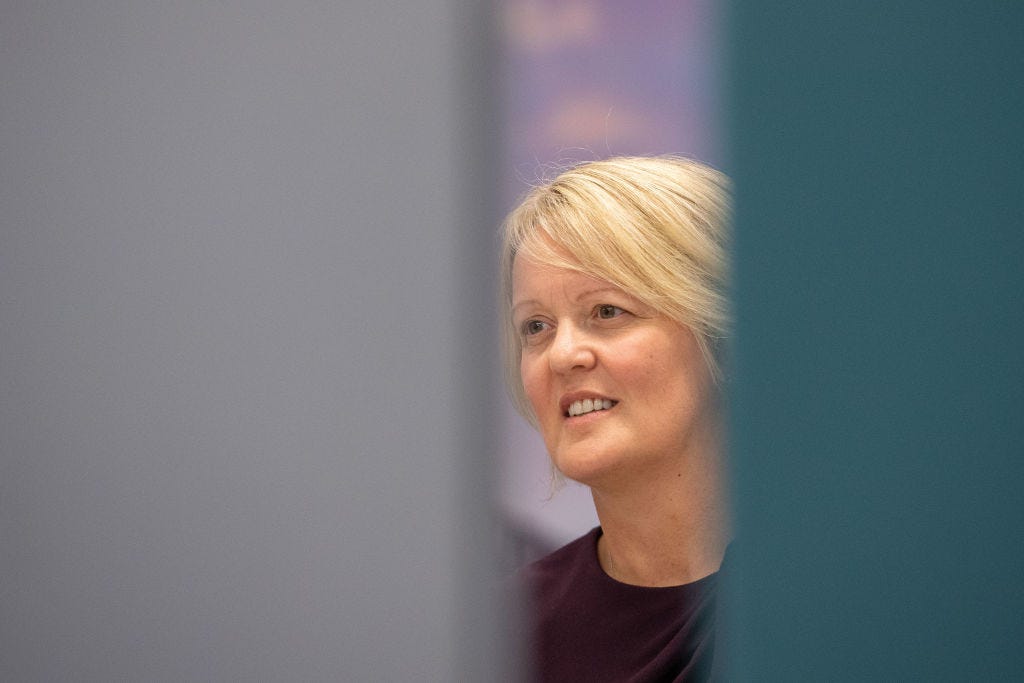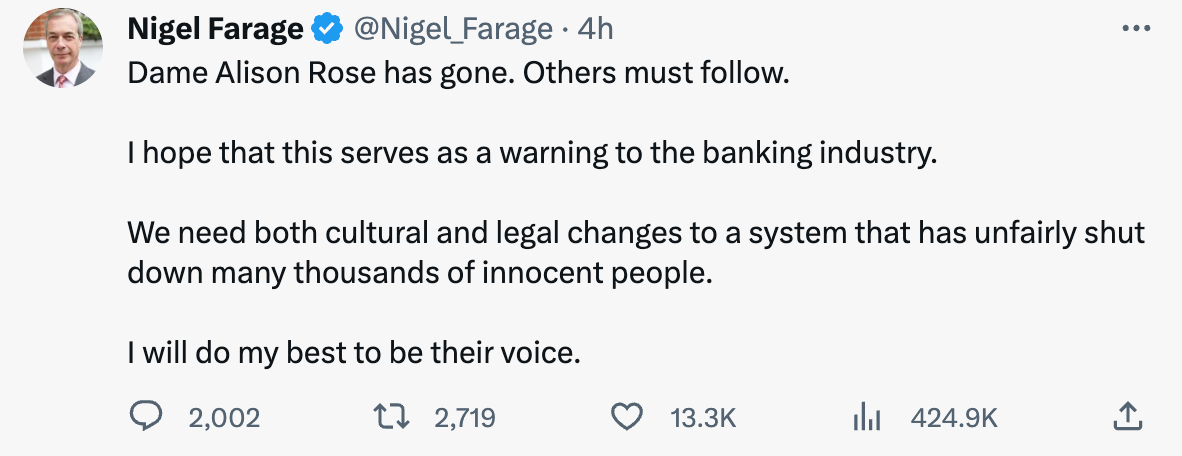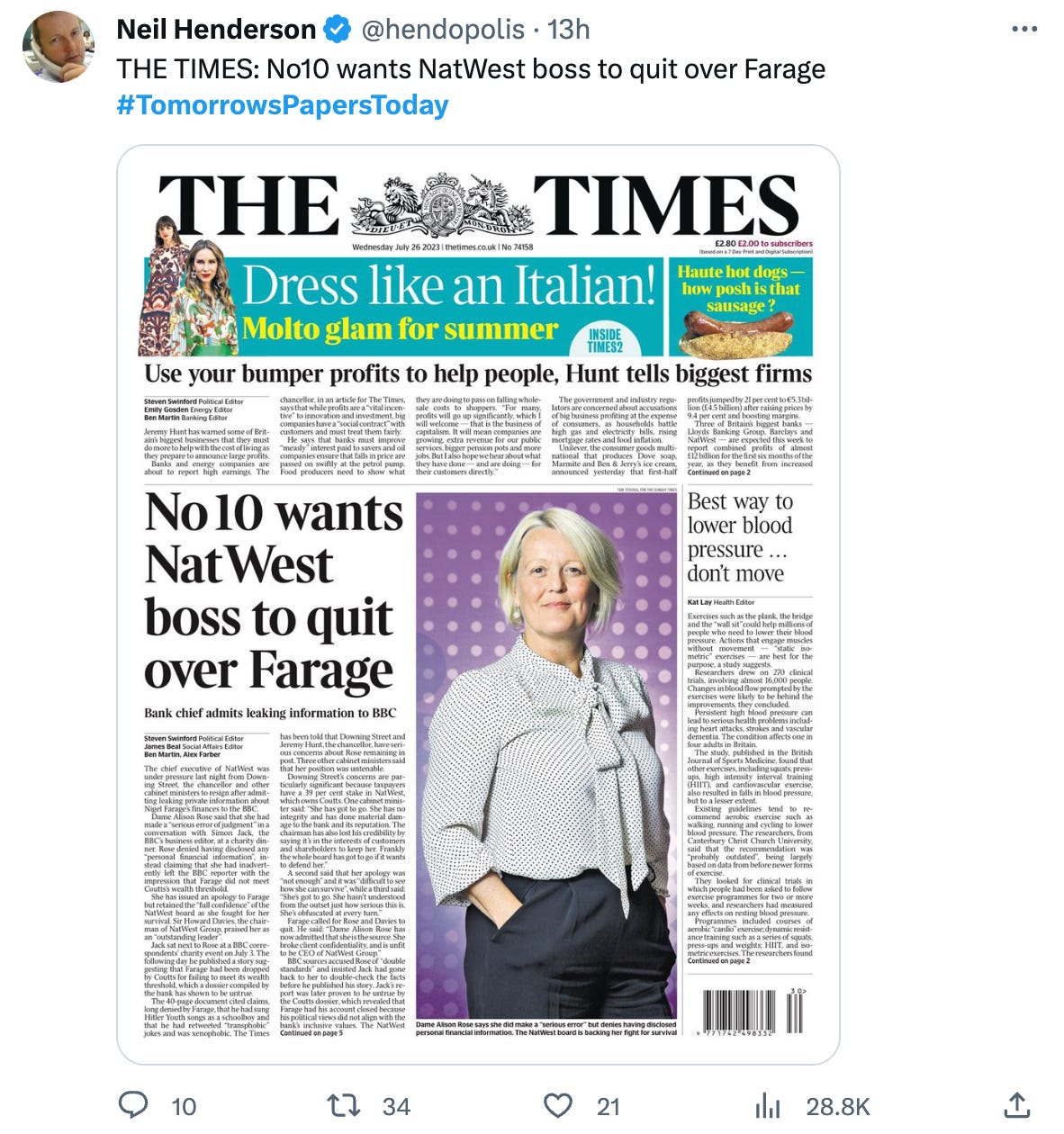Hello and welcome to the latest Off to Lunch…
Dame Alison Rose has stood down as the chief executive of Natwest Group after admitting that she discussed Nigel Farage’s bank account with Simon Jack, the BBC business editor.
Shares in Natwest have fallen by more than 3 per cent today in response to the announcement, which was made in the early hours of this morning. However, you will find it hard to find anyone who is not supportive of Dame Alison’s departure. Downing Street, Keir Starmer and a string of others have backed the decision….
Here is some of the reaction:
Nils Pratley has written an analysis for The Guardian in which he points out that a junior member of Natwest staff who had breached confidentiality like Dame Alison would have expected to lose their job. He writes:
Can Rose say in all honesty that she would have looked leniently on a Natwest employee in similar circumstances? And could the board of Natwest claim the same? Unlikely.
That is the central point in the latest chapter of this bizarre tale. The wider affair has many layers – such as banks’ obligation to treat customers fairly if they wish to close accounts – but the angle specific to Rose was about confidentiality. If Natwest’s privacy policy is as strict as it is presented, it has to be seen to apply to all employees. A junior member of staff would expect to lose his or her job. In expressing its “full confidence” in Rose on Tuesday evening, the NatWest board and its chair, Sir Howard Davies, looked as if they were giving the chief executive special treatment.
You can find that piece here
Meanwhile, Adrian Wooldridge writes for Bloomberg that getting involved in politics is “undermining business by embroiling it in culture wars and alienating significant sections of the population”. He writes:
The most important problem is that most CEOs are not very good at politics — or at least democratic politics as opposed to corporate politics. They are primarily trained in business principles rather than political theory or practice — that is, in getting things done within the context of hierarchical structures and easy-to-follow metrics rather than in debating values and appeasing noisy constituencies. Democratic politics is an altogether noisier and messier world.
You can find that piece here
Rishi Sunak, the prime minister, has moved quickly to take Dame Alison out of his business council, which only met for the first time last week. A spokesperson for 10 Downing Street said:
Following her resignation as CEO of NatWest Group, the government has confirmed that Dame Alison Rose is no longer a member of the prime minister’s business council.
Before we look at other stories, a quick reminder of how this saga has unfolded over the last month:
-Nigel Farage, the former leader of the UK Independence Party, revealed at the end of June that Coutts, a private bank and wealth manager owned by Natwest, had closed his account. Farage claimed he had been “debanked” for political reasons.
-Simon Jack and the BBC then ran a story which said Farage’s account had been closed because he did not have enough money in it and therefore had fallen below Coutts’ financial threshold. That story (now with a correction) is here
-Farage then obtained and published a 40-page internal document from Coutts that showed the bank had analysed his views and activities. This document said that Farage’s public views “were at odds with our position as an inclusive organisation”.
-The BBC apologised for its story and Jack said it had been based on information from a “trusted and senior source”
-On Tuesday evening Natwest released a statement in which Dame Alison admitted she was the source of Jack’s story. Dame Alison said she had made a “serious error of judgment in discussing Mr Farage’s relationship with the bank” but insisted that she “did not reveal any personal financial information about Mr Farage”. Sir Howard Davies, the chairman of Natwest, said the board was standing by Dame Alison and “retains full confidence in Ms Rose as CEO of the bank”. You can see that statement here
-Downing Street and Jeremy Hunt, the chancellor, swiftly raised concerns that Dame Alison had kept her job, according to a report last night by The Times. Three cabinet ministers said off-the-record that she should go. The government still owns 39 per cent of Natwest, so this was obviously significant. The pressure on Dame Alison to go featured prominently in Wednesday’s newspapers…
-The board of Natwest convened an emergency board meeting on Tuesday night and announced in the early hours of Wednesday morning that Dame Alison “has agreed by mutual consent to step down as group chief executive with immediate effect”. Paul Thwaite, the chief executive of Natwest’s commercial and institutional business, has been named as the interim boss. Sir Howard said:
“It is a sad moment. She has dedicated all her working life so far to NatWest and will leave many colleagues who respect and admire her.”
You can find that statement here
Other stories that matter…
1. The Manchester-based online retail business THG is in talks to buy City AM, the free financial newspaper and website. THG is an unexpected buyer for City AM. Matt Moulding, the founder and chief executive of THG, has been critical of the UK media and its business coverage. Check-out his LinkedIn posts for examples of that here. However, THG is suggesting that it will use its digital expertise to expand City AM and that the publication will retain its editorial independence. Sky News broke this story here
2. Joe Lewis, the owner of Tottenham Hotspur, has been charged with “brazen” insider trading in the US. More details in this story by The Guardian here
3. Shares in Rolls-Royce have risen by more than 20 per cent after the company said that profits were higher than expected. The engineer maker appears to have benefitted from a cost-cutting drive by new chief executive Tufan Erginbilgic, who had described the company as a “burning platform”. However, Rolls shares remain well down on recent highs, as this share price graph below shows. You can find Rolls’ trading statement here.
Other big UK companies reporting results today include Lloyds Banking Group, GSK and Reckitt Benckiser. Lloyds has said that its net interest margin fell by eight basis points to 3.14 per cent in the second quarter of 2023. This will please politicians. The net interest margin is the difference between what the bank makes from interest payments on debt versus the interest payments it pays out to savers. Jeremy Hunt has written in The Times this morning about how companies need to treat customers fairly, knowing that a string of big businesses will report strong results over the next weeks. Piece here.
The results from Lloyds also include its latest assumptions about the outlook for the UK economy, which are always interesting given that it is the country’s largest mortgage lender. You can see those assumptions below:
4. Internet cafes used to be community hubs that were the only place you could go online or even access a computer. The first internet cafe opened in London in September 1994. But they are disappearing around the world as home-internet becomes ubiquitous and 5G technology improves access to the internet on mobile devices. I enjoyed this piece by the Rest of World on the last internet cafes in the world and how they remain important in places such as Uganda. Piece here
5. Focusing on one task at a time and avoiding distractions like social media is key to boosting productivity and happiness in the workplace, according to this interview by author David Epstein with psychologist Gloria Mark. Piece here
And finally…
Many readers will already be aware of Manchester-based brewery Cloudwater, but for those who aren’t, their craft beer is arguably the best in the UK and their taprooms are also worth visiting. Cloudwater is still independently owned and run by co-founder Paul Jones. It has a brewery and taproom in Piccadilly, Manchester as well as the Sadler’s Cat pub in central Manchester and a taproom in Bermondsey, south London. Jones told the BBC earlier this year that the pressure of running the business had been a “never-ending nightmare” since the start of the Covid-19 crisis due to the array of challenges it has faced. You can find the BBC piece here and more detail on Cloudwater here
Thanks for reading. If you enjoy Off to Lunch then please share it with others and spread the word. If this newsletter was shared with you then please sign-up below to become a member, get Off to Lunch sent directly to your inbox, and contribute to the work of Off to Lunch
Best
Graham













